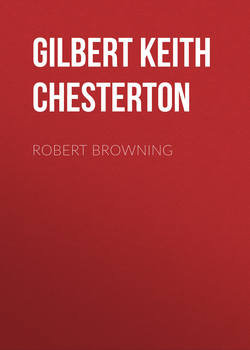Robert Browning

Реклама. ООО «ЛитРес», ИНН: 7719571260.
Оглавление
Gilbert Keith Chesterton. Robert Browning
CHAPTER I. BROWNING IN EARLY LIFE
CHAPTER II. EARLY WORKS
CHAPTER III. BROWNING AND HIS MARRIAGE
CHAPTER IV. BROWNING IN ITALY
CHAPTER V. BROWNING IN LATER LIFE
CHAPTER VI. BROWNING AS A LITERARY ARTIST
CHAPTER VII. THE RING AND THE BOOK
CHAPTER VIII. THE PHILOSOPHY OF BROWNING
Отрывок из книги
In 1840 Sordello was published. Its reception by the great majority of readers, including some of the ablest men of the time, was a reception of a kind probably unknown in the rest of literary history, a reception that was neither praise nor blame. It was perhaps best expressed by Carlyle, who wrote to say that his wife had read Sordello with great interest, and wished to know whether Sordello was a man, or a city, or a book. Better known, of course, is the story of Tennyson, who said that the first line of the poem —
and the last line —
.....
In the same manner, of course, outward obscurity is in a young author a mark of inward clarity. A man who is vague in his ideas does not speak obscurely, because his own dazed and drifting condition leads him to clutch at phrases like ropes and use the formulæ that every one understands. No one ever found Miss Marie Corelli obscure, because she believes only in words. But if a young man really has ideas of his own, he must be obscure at first, because he lives in a world of his own in which there are symbols and correspondences and categories unknown to the rest of the world. Let us take an imaginary example. Suppose that a young poet had developed by himself a peculiar idea that all forms of excitement, including religious excitement, were a kind of evil intoxication, he might say to himself continually that churches were in reality taverns, and this idea would become so fixed in his mind that he would forget that no such association existed in the minds of others. And suppose that in pursuance of this general idea, which is a perfectly clear and intellectual idea, though a very silly one, he were to say that he believed in Puritanism without its theology, and were to repeat this idea also to himself until it became instinctive and familiar, such a man might take up a pen, and under the impression that he was saying something figurative indeed, but quite clear and suggestive, write some such sentence as this, "You will not get the godless Puritan into your white taverns," and no one in the length and breadth of the country could form the remotest notion of what he could mean. So it would have been in any example, for instance, of a man who made some philosophical discovery and did not realise how far the world was from it. If it had been possible for a poet in the sixteenth century to hit upon and learn to regard as obvious the evolutionary theory of Darwin, he might have written down some such line as "the radiant offspring of the ape," and the maddest volumes of mediæval natural history would have been ransacked for the meaning of the allusion. The more fixed and solid and sensible the idea appeared to him, the more dark and fantastic it would have appeared to the world. Most of us indeed, if we ever say anything valuable, say it when we are giving expression to that part of us which has become as familiar and invisible as the pattern on our wall paper. It is only when an idea has become a matter of course to the thinker that it becomes startling to the world.
It is worth while to dwell upon this preliminary point of the ground of Browning's obscurity, because it involves an important issue about him. Our whole view of Browning is bound to be absolutely different, and I think absolutely false, if we start with the conception that he was what the French call an intellectual. If we see Browning with the eyes of his particular followers, we shall inevitably think this. For his followers are pre-eminently intellectuals, and there never lived upon the earth a great man who was so fundamentally different from his followers. Indeed, he felt this heartily and even humorously himself. "Wilkes was no Wilkite," he said, "and I am very far from being a Browningite." We shall, as I say, utterly misunderstand Browning at every step of his career if we suppose that he was the sort of man who would be likely to take a pleasure in asserting the subtlety and abstruseness of his message. He took pleasure beyond all question in himself; in the strictest sense of the word he enjoyed himself. But his conception of himself was never that of the intellectual. He conceived himself rather as a sanguine and strenuous man, a great fighter. "I was ever," as he says, "a fighter." His faults, a certain occasional fierceness and grossness, were the faults that are counted as virtues among navvies and sailors and most primitive men. His virtues, boyishness and absolute fidelity, and a love of plain words and things are the virtues which are counted as vices among the æsthetic prigs who pay him the greatest honour. He had his more objectionable side, like other men, but it had nothing to do with literary egotism. He was not vain of being an extraordinary man. He was only somewhat excessively vain of being an ordinary one.
.....